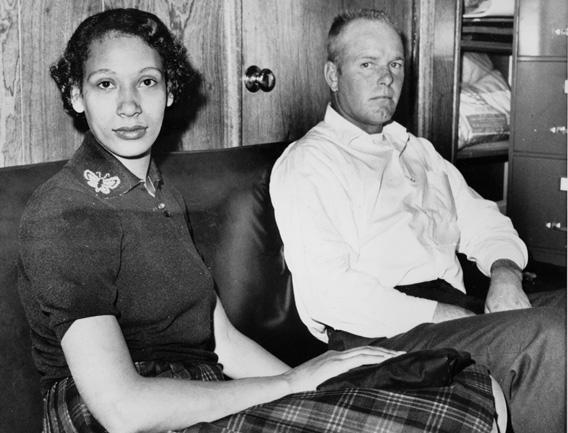During yesterday’s oral arguments over the constitutionality of California’s ban on gay marriage, Justice Antonin Scalia claimed that there is “considerable disagreement among sociologists” as to whether being raised by a same-sex couple is “harmful to the child.” The lawyers arguing the case repeatedly brought up the landmark 1967 decision Loving v. Virginia, which struck down interracial marriage bans. Did supporters of the ban argue that interracial marriage was harmful to children in that case, too?
Absolutely. The state of Virginia presented two arguments in support of its interracial marriage ban in 1967. The first was that the authors of the 14th Amendment to the Constitution explicitly stated that they did not intend to strike down anti-miscegenation laws, which were common in the 19th century. The second argument was that interracial marriages were uniquely prone to divorce and placed undue psychological stress on children.
The parallels between the two cases are striking. The defenders of California’s Prop 8 rely heavily on the work of University of Texas sociologist Mark Regnerus, who argued in a 2012 study that the children of people who engage in same-sex relationships have worse psychological, social, and economic outcomes. (The study generated enormous controversy, and its conclusions have been largely rejected by other social scientists.) In 1967, the state of Virginia’s expert of choice was Albert Gordon, whose book Intermarriage: Interfaith, Interracial, Interethnic attacked the adequacy of interracial parenting. According to Virginia’s solicitor general Robert McIlwaine, Gordon concluded that interracial marriages “hold no promise for a bright and happy future for mankind” and “bequeath to the progeny of those marriages more psychological problems than the parents have a right to bequeath to them.” Interracial marriage is so undesirable, McIlwaine continued, that its negative effects can’t even be managed. He argued that it “causes a child to have almost insuperable difficulties in identification and that the problems which a child of an interracial marriage faces are those which no child can come through without damage to himself.”
Virginia didn’t merely critique the parenting skills of interracial couples—the state attacked their very mental stability. Again citing Gordon, McIlwaine claimed that people who have the temerity to engage in interracial marriage have a “rebellious attitude towards society, self-hatred, neurotic tendencies, immaturity, and other detrimental psychological factors.” The implication was that these qualities rendered them unfit parents. The fact that the defenders of Prop 8 did not make similar arguments about gay people before the Supreme Court on Tuesday, even though such attitudes still exist, is an indication of how society has changed since 1967. (The language used in the oral arguments is another indication: Both the justices and the attorneys in the Loving oral argument repeatedly used antiquated racial terms like Mongol, Malay, negro, and mongrel.)
There are a few interracial parenting arguments from Loving that Prop 8’s defenders simply could not adapt to their own case. For example, pointing to comments by a University of Chicago professor, Virginia hinted in 1967 that intermingling the genes of different races might result in unknown physical deformities.
It’s somewhat surprising that the attorneys for Prop 8 chose to make the “bad parents” argument at all, because it gained no traction in 1967. Justice Potter Stewart pointed out during the hearing that “one reason that marriages of this kind are sometimes unsuccessful is the existence of the kind of laws that are in issue here.” Chief Justice Earl Warren apparently found the argument so unconvincing that he barely mentioned it in his opinion striking down Virginia’s anti-miscegenation law.
The anti-anti-miscegenation reformers may have faced a slightly easier road back in 1967 than gay marriage advocates face today. In the 13 years that passed between Brown v. Board of Education and Loving, more than a dozen states repealed their bans on interracial marriage. Today, nine states have approved gay marriage, either by vote, legislation, or judicial decision. Although there is little data on public attitudes toward anti-miscegenation laws in 1967, only 37 percent of Americans supported them by 1972. Nearly one-half of the country still opposes gay marriage.
Got a question about today’s news? Ask the Explainer
Explainer thanks Tucker Culbertson of Syracuse University College of Law and Michael Rosenfeld of Stanford University, author of The Age of Independence: Interracial Unions, Same-Sex Unions, and the Changing American Family.
Read more from Slate’s coverage of gay marriage cases at the Supreme Court.
